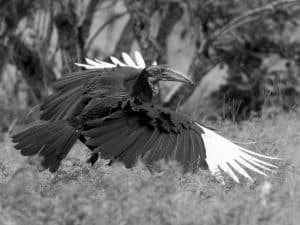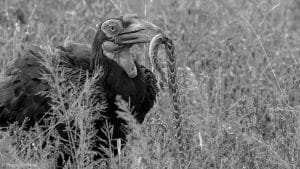Introduction to the Ground-Hornbills in Tanzania
Nestled in the heart of East Africa, Tanzania is home to a remarkable array of wildlife, including the iconic ground-hornbills. These majestic birds, with their striking black plumage and vibrant red facial patches, hold a significant place in the country’s natural heritage. The ground-hornbills in Tanzania are known for their distinctive booming calls that resonate through the savannah, and their presence is deeply intertwined with the ecological balance of the region. Found in diverse habitats, from woodlands to open plains, these birds are not only a sight to behold but also play a crucial role in the ecosystem.

The ground-hornbills are an integral part of the intricate web of life in Tanzania. As apex predators, they help regulate the populations of small mammals and insects, thereby contributing to the overall health of the ecosystem. Their foraging behavior also aids in seed dispersal, promoting the growth of vegetation and maintaining the delicate equilibrium of their habitats. Furthermore, these birds are significant cultural symbols for many local communities, embodying a connection to the land and serving as a source of inspiration and folklore.
The conservation of ground-hornbills is imperative to safeguard the ecological integrity of Tanzania. With their dwindling numbers and increasing threats, concerted efforts are essential to ensure the survival of these magnificent birds for future generations to admire and cherish.
Importance of Ground-Hornbills in the Ecosystem
The presence of ground-hornbills in the Tanzanian ecosystem is of paramount importance, influencing a myriad of ecological processes and contributing to the overall biodiversity of the region. As apex predators, these birds play a crucial role in controlling the populations of small mammals and insects, preventing unchecked proliferation that could disrupt the delicate balance of the ecosystem. By preying on a variety of species, including rodents and reptiles, ground-hornbills help maintain the stability of the food chain, thereby mitigating the risk of overpopulation and subsequent habitat degradation.
In addition to their role as predators, ground-hornbills also contribute to the dispersal of seeds, a fundamental process for the regeneration of plant species in their habitats. As they forage for food, these birds inadvertently transport seeds over significant distances, aiding in the propagation of vegetation and the restoration of degraded landscapes. This act of seed dispersal not only supports the diversity of plant species but also fosters the resilience of the ecosystem, particularly in the face of environmental challenges such as deforestation and habitat fragmentation.
Furthermore, the cultural significance of ground-hornbills cannot be overstated. For many indigenous communities in Tanzania, these birds hold deep spiritual and symbolic value, representing a connection to the natural world and serving as a source of cultural identity and heritage. Their presence in local folklore and traditions underscores the intrinsic link between wildlife conservation and the preservation of cultural heritage, highlighting the multifaceted importance of ground-hornbills in the Tanzanian ecosystem.
Threats to the Survival of Ground-Hornbills in Tanzania
Despite their ecological significance and cultural relevance, ground-hornbills in Tanzania face a myriad of threats that jeopardize their survival. Habitat loss, primarily driven by deforestation, agricultural expansion, and urban development, poses a significant challenge to these birds. As their natural habitats continue to diminish, ground-hornbills encounter increased competition for resources and are forced into fragmented and degraded landscapes, making them more vulnerable to predation and human-induced disturbances.
Moreover, the illegal wildlife trade and poaching have emerged as critical threats to ground-hornbills. The demand for their body parts, including feathers, beaks, and other ornamental items, has led to targeted hunting, further decimating their populations. This illicit trade not only undermines the conservation efforts but also disrupts the natural balance of the ecosystem, as the loss of ground-hornbills can have cascading effects on the entire food web, affecting the populations of prey species and altering the dynamics of their habitats.
Another pressing concern is the impact of human-wildlife conflict on ground-hornbills. Encounters with domestic animals and human settlements often result in direct and indirect harm to these birds, leading to injuries and fatalities. Additionally, the use of pesticides and other agrochemicals in agricultural practices poses a threat to ground-hornbills, as the accumulation of toxic substances in their prey can have detrimental effects on their health and reproductive success, further exacerbating the challenges they face in the wild.
Conservation Efforts for Ground-Hornbills in Tanzania

Recognizing the urgent need to protect ground-hornbills, a range of conservation initiatives and strategies have been implemented in Tanzania. One of the key approaches involves the establishment and management of protected areas and wildlife reserves that encompass the habitats critical for the survival of ground-hornbills. These protected areas serve as havens for these birds, offering sanctuary from the pressures of human encroachment and providing essential breeding and foraging grounds to sustain their populations.
Furthermore, community-based conservation programs have been instrumental in engaging local residents in the protection of ground-hornbills and their habitats. By involving communities in conservation activities, such as habitat restoration, anti-poaching patrols, and environmental education, these programs foster a sense of ownership and stewardship among the people living in proximity to ground-hornbill habitats, thereby promoting sustainable coexistence and minimizing human-wildlife conflicts.
In addition to on-the-ground conservation efforts, research and monitoring play a pivotal role in understanding the ecology and behavior of ground-hornbills, as well as identifying and addressing the specific challenges they face. Scientific studies and population surveys contribute valuable data that inform conservation strategies and guide targeted interventions to mitigate the threats to these birds, ensuring a holistic and evidence-based approach to their protection.
Success Stories in Ground-Hornbill Conservation
Amidst the challenges, there have been notable successes in the conservation of ground-hornbills in Tanzania. Through collaborative efforts between government agencies, non-profit organizations, and local communities, significant strides have been made in reversing the decline of ground-hornbill populations. The establishment of protected areas and wildlife corridors has provided vital refuges for these birds, enabling them to thrive and expand their ranges within secure habitats.
Moreover, conservation initiatives have yielded positive outcomes in terms of community engagement and awareness. By involving local residents in conservation activities and fostering a sense of shared responsibility, these efforts have contributed to the reduction of human-wildlife conflicts and the promotion of harmonious coexistence between people and ground-hornbills. Educational programs and outreach campaigns have also played a pivotal role in raising awareness about the importance of ground-hornbill conservation, garnering support from diverse stakeholders and fostering a culture of conservation within the broader society.
The successes in ground-hornbill conservation exemplify the power of collaboration and proactive engagement, demonstrating that with concerted efforts and a multifaceted approach, it is possible to reverse the trajectory of decline and secure a future for these remarkable birds in Tanzania.
The Role of Local Communities in Ground-Hornbill Conservation
Local communities in Tanzania play a pivotal role in the conservation of ground-hornbills, serving as key allies in the protection of these birds and their habitats. With their intimate knowledge of the landscapes and ecosystems where ground-hornbills reside, community members are valuable partners in conservation efforts, offering insights into the behavior and movements of these birds and contributing to the development of sustainable management plans.
Empowering local communities through capacity-building initiatives and participatory decision-making processes enhances their ability to actively contribute to ground-hornbill conservation. By providing training in conservation practices, sustainable land use, and alternative livelihoods, these programs enable community members to support the protection of ground-hornbills while improving their own well-being and livelihood security. This integrated approach fosters a sense of shared responsibility and cooperation, aligning the interests of communities with the goals of conservation.
Furthermore, the cultural significance of ground-hornbills within local traditions and belief systems underscores the intrinsic connection between wildlife conservation and the preservation of cultural heritage. By acknowledging and respecting the cultural values associated with these birds, conservation efforts can leverage local knowledge and traditions to instill a sense of pride and custodianship among community members, thereby fostering a deep-rooted commitment to the protection of ground-hornbills and their habitats.
Challenges in Ground-Hornbill Conservation
While progress has been made in ground-hornbill conservation, several challenges persist, posing significant obstacles to their long-term survival in Tanzania. Habitat loss and fragmentation continue to threaten the viability of ground-hornbill populations, as the encroachment of human activities and the expansion of infrastructure erode their natural habitats, limiting their access to crucial resources and breeding sites.
The pervasive impact of poaching and illegal wildlife trade remains a pressing concern, as the demand for ground-hornbill body parts persists in certain markets, driving targeted hunting and trapping of these birds. Efforts to combat poaching and trafficking require sustained vigilance and enforcement measures to disrupt the illicit trade networks and dismantle the illegal supply chains that perpetuate the exploitation of ground-hornbills.
Furthermore, the complexities of human-wildlife conflicts necessitate comprehensive strategies to mitigate the interactions between ground-hornbills and human communities. Addressing the underlying causes of conflicts, such as competition for resources and land use conflicts, requires a nuanced approach that balances the needs of both people and wildlife, fostering coexistence and minimizing negative impacts on ground-hornbill populations.
How to Support Ground-Hornbill Conservation in Tanzania

Individuals and organizations can contribute to the conservation of ground-hornbills in Tanzania through various means, thereby supporting the efforts to safeguard these birds and their habitats for future generations. One impactful way to support ground-hornbill conservation is by raising awareness about their ecological importance and the challenges they face. By sharing information about the plight of ground-hornbills and advocating for their protection, individuals can amplify the message of conservation and mobilize collective action to address the threats to these birds.
Financial support for conservation organizations and initiatives working on ground-hornbill protection is another tangible way to make a difference. By donating to reputable conservation groups or participating in fundraising campaigns, individuals can contribute directly to the implementation of conservation projects, research endeavors, and community engagement activities that are instrumental in safeguarding ground-hornbills and their habitats.
Volunteer opportunities and ecotourism initiatives offer avenues for individuals to actively engage in ground-hornbill conservation on the ground. By volunteering for conservation programs or participating in ecotourism activities that prioritize responsible wildlife viewing and contribute to local conservation efforts, individuals can directly support the protection of ground-hornbills while experiencing the natural beauty of their habitats.
Organizations and Initiatives Working on Ground-Hornbill Conservation
Several organizations and initiatives are dedicated to the conservation of ground-hornbills in Tanzania, employing a range of strategies to protect these birds and their habitats. The Mpingo Conservation & Development Initiative is one such organization that focuses on community-based conservation and sustainable natural resource management, working closely with local communities to promote the conservation of ground-hornbills and other wildlife species.
The Wildlife Conservation Society (WCS) Tanzania is actively involved in ground-hornbill conservation, conducting research, implementing conservation programs, and collaborating with government agencies and local stakeholders to protect the country’s biodiversity. Through its holistic approach to wildlife conservation, WCS Tanzania addresses the interconnected challenges facing ground-hornbills and other species, striving to secure a future for Tanzania’s natural heritage.
In addition, the Tanzanian government, through its wildlife authorities and protected area management agencies, plays a pivotal role in the conservation of ground-hornbills. By enacting and enforcing regulations that safeguard wildlife and their habitats, as well as supporting conservation initiatives and research endeavors, the government contributes to the overarching efforts to protect ground-hornbills and ensure the ecological integrity of the country’s landscapes.
Conclusion and Future Outlook
In conclusion, the conservation of ground-hornbills in Tanzania represents a vital wildlife protection effort that is intricately linked to the ecological health, cultural heritage, and biodiversity of the region. As these iconic birds face a myriad of threats, ranging from habitat loss and poaching to human-wildlife conflicts, concerted conservation efforts are essential to ensure their survival and the preservation of their habitats.
With the collaborative endeavors of local communities, conservation organizations, and governmental agencies, there have been notable successes in ground-hornbill conservation, demonstrating the power of collective action and proactive engagement. By addressing the challenges and harnessing the cultural significance of these birds, Tanzania is poised to secure a future where ground-hornbills thrive within thriving ecosystems, embody the resilience of their habitats, and continue to inspire and connect people to the natural world.
Looking ahead, the future outlook for ground-hornbill conservation in Tanzania hinges on sustained commitment, innovative approaches, and inclusive partnerships that prioritize the well-being of these birds and the ecosystems they inhabit. By building on the achievements and leveraging the momentum of conservation initiatives, Tanzania can chart a course toward a future where ground-hornbills flourish, symbolizing the enduring legacy of wildlife protection and the harmonious coexistence of people and nature.
































